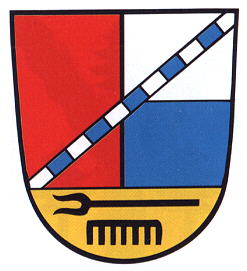Katzhütte: Difference between revisions
Knorrepoes (talk | contribs) m (Text replacement - "/Arms of " to "/Arms (crest) of ") |
Knorrepoes (talk | contribs) m (Text replacement - "{{media}}" to " {{de1}} {{media1}}") |
||
| Line 24: | Line 24: | ||
The red-silver-blue field in the upper part of the arms is derived from the arms of the Von Schaumburg family, an important family in the local history. The silver and blue bend symbolises the railway line which played a role in the local development. The base shows a fork and comb, taken from the arms of the Counts of Schwarzburg, who ruled the village until 1920. | The red-silver-blue field in the upper part of the arms is derived from the arms of the Von Schaumburg family, an important family in the local history. The silver and blue bend symbolises the railway line which played a role in the local development. The base shows a fork and comb, taken from the arms of the Counts of Schwarzburg, who ruled the village until 1920. | ||
{{ | |||
{{de1}} | |||
{{media1}} | |||
[[Civic Heraldry Literature - Germany|'''Literature''']]: Ulle, 1997. | [[Civic Heraldry Literature - Germany|'''Literature''']]: Ulle, 1997. | ||
Revision as of 12:37, 26 December 2022
This page is part of the German heraldry portal Deutsche Wappensammlung |
Heraldry of the World |
|
German heraldry:
|
Selected collector's items from Germany:
|
KATZHÜTTE
State : Thüringen
District (Kreis) : Saalfeld-Rudolstadt
| German |
Über goldenem Schildfuß, darin ein schwarzer Kamm unter einer liegenden schwarzen Gabel, gespalten und halb geteilt von Rot, Silber und Blau überdeckt durch einen schräglinken von Silber und Blau gestückten Stabbalken. |
| English | No blazon/translation known. Please click here to send your (heraldic !) blazon or translation |
Origin/meaning
The arms were officially granted in 1991.
The red-silver-blue field in the upper part of the arms is derived from the arms of the Von Schaumburg family, an important family in the local history. The silver and blue bend symbolises the railway line which played a role in the local development. The base shows a fork and comb, taken from the arms of the Counts of Schwarzburg, who ruled the village until 1920.
Literature: Ulle, 1997.


